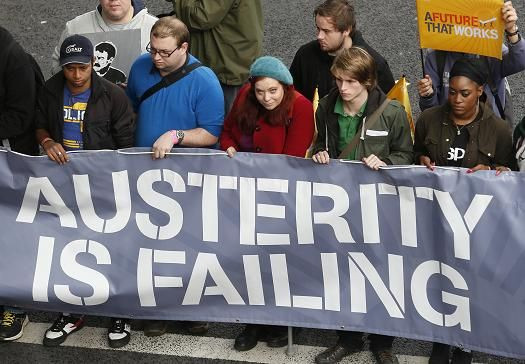One In 10 British Workers Is Underemployed

Ten percent of Britain’s workers are now underemployed – meaning they are unable to work a sufficient number of hours to meet their basic needs – according to a study by the government’s Office for National Statistics (ONS).
The number of such underemployed has climbed by almost 1 million to 3 million since the beginning of the recession in 2008.
“During this period many workers moved from full-time to part-time roles and many of those returning to work after a period of unemployment could only find part-time jobs,” ONS said.
“Of the extra 1 million underemployed workers in 2012 compared with 2008, three-quarters were in part-time posts.”
The underemployment phenomenon has been hidden from the perception that overall unemployment appears to have leveled off, under 8 percent.
The ongoing recession has hamstrung employers from extending worker hours.
The problem is particularly acute among the young and the poor. One-fifth of Britons between the ages of 16 and 24 want to work more hours than their employers can offer. Low-skilled workers, such as laborers, cleaners and caterers, are also hurting from too few hours.
British union leaders said the data understates the problem.
“Around 2.5 million across the UK are currently out of work, but this figure only tells half the story,” said TUC General Secretary Brendan Barber in a statement.
‘The fact that the number of underemployed people continues to grow shows just how weak our recovery is, and how fragile the labor market remains.”
He added: "Being underemployed carries a huge pay penalty that puts a real strain on people's finances. Long periods of underemployment can cause longer term career damage, which is particularly worrying for the one in five young people currently trapped in it."
Jane Tomlinson, a part-time worker in Oxford, told the BBC: "I work only 15 hours a week paid work for a charity as communications manager. I don't actually want a full-time job, but I need more than 15 hours a week, so I pick up a bit of copywriting work here and there as I can find it.”
She lamented: "But month to month it's really tough as I make only just enough to pay the bills. Thank goodness my husband has a job.”
Labor market economist John Philpott further warned that with declining hours, average take-home is also falling.
“The extent of underemployment identified in these official figures highlights the degree to which the headline unemployment count understates the current shortage of work in the UK economy,” he said.
“While some work is obviously better than none, approaching one in five economically active people are struggling in today's 'no or not enough work' economy. Add in the effect of falling real take-home pay for the vast majority of people in work and it becomes clear how much distress is being suffered in the jobs market.”
© Copyright IBTimes 2024. All rights reserved.



















